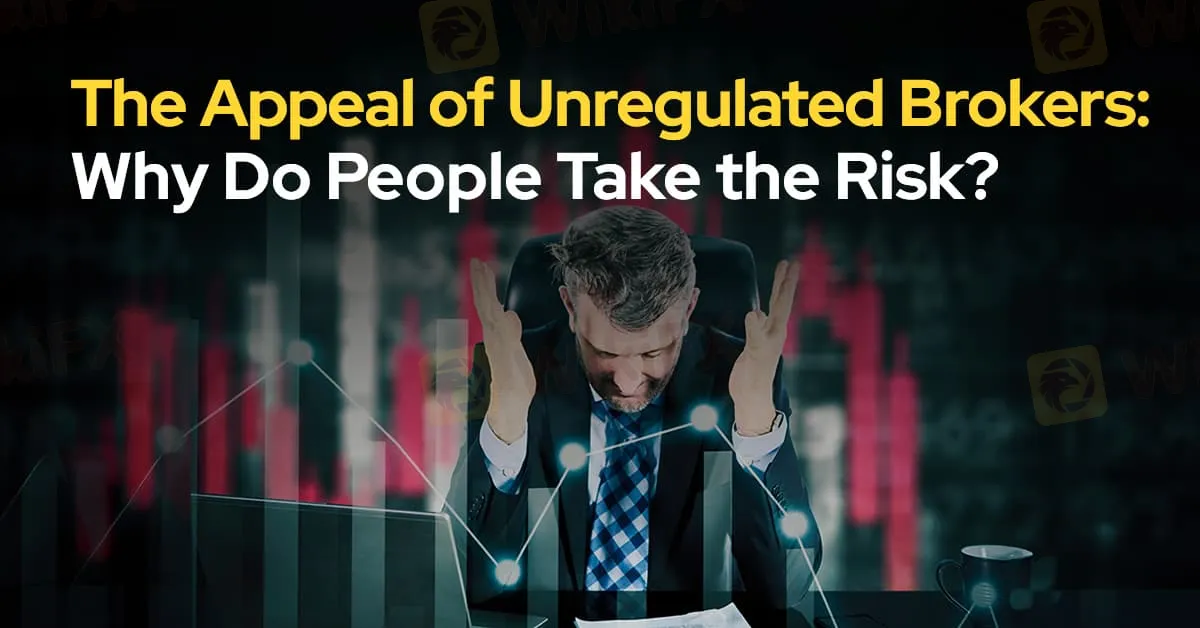简体中文
繁體中文
English
Pусский
日本語
ภาษาไทย
Tiếng Việt
Bahasa Indonesia
Español
हिन्दी
Filippiiniläinen
Français
Deutsch
Português
Türkçe
한국어
العربية
The Appeal of Unregulated Brokers: Why Do People Take the Risk?
Abstract:While it seems like a no-brainer to opt for a broker with regulatory oversight, many traders are still drawn to unregulated brokers. The question is: why do some traders take the risk?

When navigating the world of online trading, one of the most critical decisions traders face is choosing between a regulated or unregulated broker. While it seems like a no-brainer to opt for a broker with regulatory oversight, many traders are still drawn to unregulated brokers. The question is: why do some traders take the risk? What factors make unregulated brokers so appealing, and could they ultimately lead to costly mistakes?
One of the most cited reasons is the promise of higher leverage. Unregulated brokers often offer much higher leverage ratios than their regulated counterparts, allowing traders to potentially amplify their returns on smaller capital. While regulators, such as the European Securities and Markets Authority (ESMA), impose leverage caps to protect traders from extreme losses, some traders view these limitations as a hindrance to maximizing their profits. Unregulated brokers remove such barriers, making them attractive to traders with a high-risk appetite.
Another draw is the perceived freedom from bureaucratic constraints. Regulated brokers must adhere to strict guidelines that can sometimes result in slower execution speeds, additional verification processes, and limited product offerings. Traders seeking flexibility may prefer the seemingly unrestrained environment of an unregulated broker, where processes are often faster and more accessible.

However, the very same factors that make unregulated brokers attractive could also be their downfall. A lack of oversight means a lack of accountability, and in the fast-paced world of online trading, this can lead to serious red flags. Fraudulent activities, such as price manipulation, unfair trading conditions, or even the outright refusal of withdrawal requests, are not uncommon. Traders may also encounter sudden changes in trading conditions, such as spreads widening without notice or even asset unavailability, leading to unanticipated losses.
The question remains: is the promise of higher leverage and fewer constraints worth the potential risks? For some traders, the answer may be yes. They believe their skills and knowledge can mitigate the risks associated with unregulated brokers. However, for others, the red flags—ranging from limited customer protection to the possibility of fraudulent activity—are too significant to ignore.
Ultimately, the debate boils down to whether the short-term rewards of unregulated brokers are worth the long-term risks. Should traders gamble on the potential for greater profits, or is the safety net provided by regulation too valuable to discard? As with many aspects of online trading, the decision may depend more on a trader's risk tolerance than on any clear-cut answer.

Disclaimer:
The views in this article only represent the author's personal views, and do not constitute investment advice on this platform. This platform does not guarantee the accuracy, completeness and timeliness of the information in the article, and will not be liable for any loss caused by the use of or reliance on the information in the article.
Read more

OctaFX Back in News: ED Attaches Assets Worth INR 134 Cr in Forex Scam Case
The Enforcement Directorate (ED) in Mumbai has attached assets worth around INR 131.45 crore. This included a luxury yacht and residential properties in Spain. Read this interesting story.

OANDA Rebrands TMS Brokers in Lithuania and Latvia Forex Markets
OANDA upgrades Baltic forex with TMS Brokers rebranding and new mobile app for enhanced trading technologies in Europe.

ActivTrades returns to profitability
London-based broker ActivTrades has released its financial results for 2024, signaling a robust turnaround following a challenging 2023. The broker recorded notable improvements in profitability, client acquisition, and capital reserves, marking a year of renewed momentum and strategic recalibration.

Admiral Markets: A Mix of Regulation and Risk
Despite multiple licenses, Admiral Markets presents potential red flags that traders should not ignore, including a suspicious clone alert and disclosure by Malaysia’s Securities Commission.
WikiFX Broker
Latest News
He Thought He Earned RM4 Million, But It Was All a Scam
CryptoCurrency Regulations in India 2025 – Key Things You Should Know
OctaFX Back in News: ED Attaches Assets Worth INR 134 Cr in Forex Scam Case
Trump inaugural impersonators scammed donors out of crypto, feds say
Ethereum is powering Wall Street's future. The crypto scene at Cannes shows how far it's come
Forex Hedging: Is It a Trader’s Safety Net or Just an Illusion?
US debt is now $37trn – should we be worried?
OPEC+ members agree larger-than-expected oil production hike in August
Dukascopy Ends EOS/USD Trading Amid Liquidity Issues
FIBO Group MT5 Cent Account with Ultra-Leverage up to 1:5000 for Beginners
Currency Calculator


